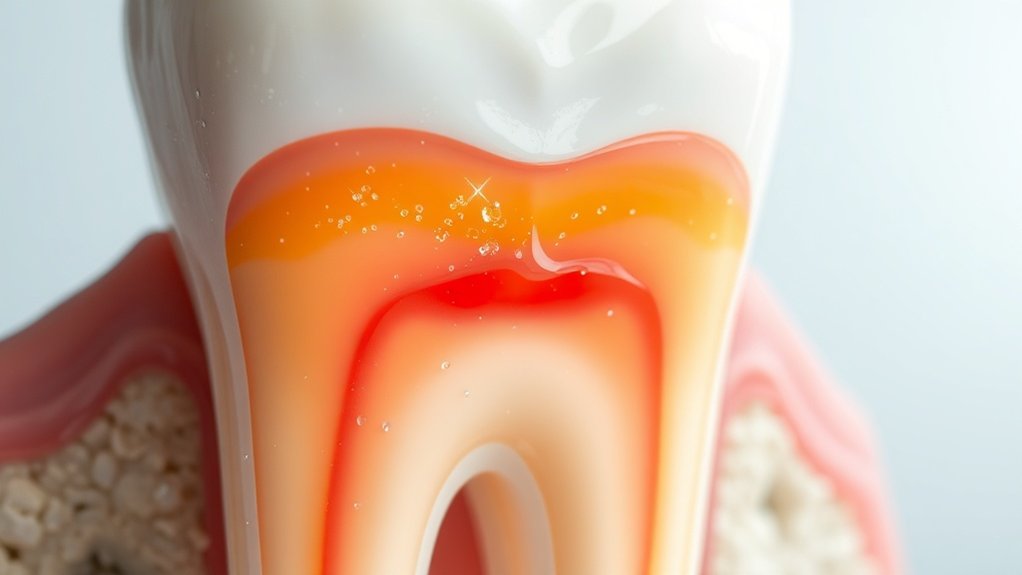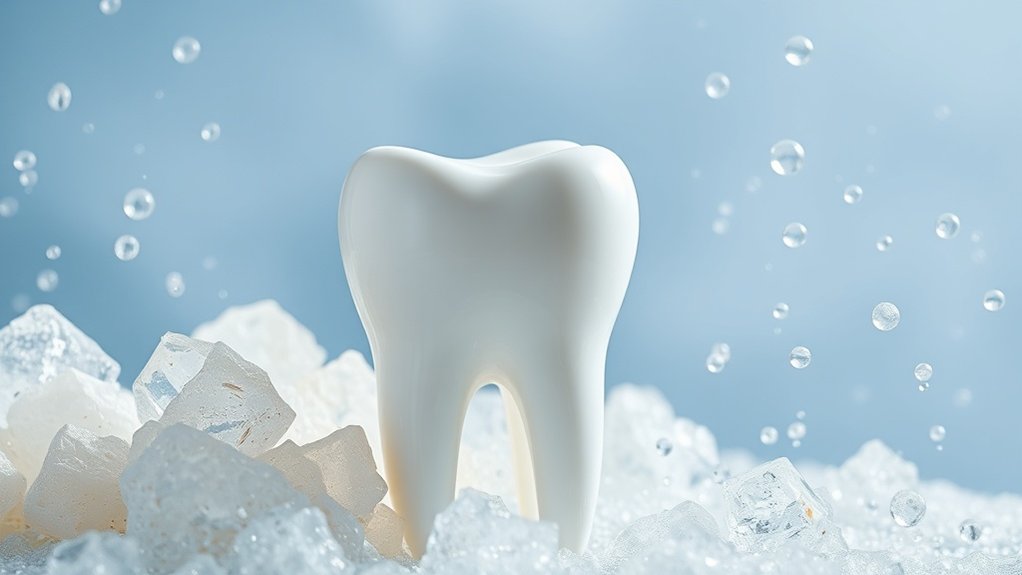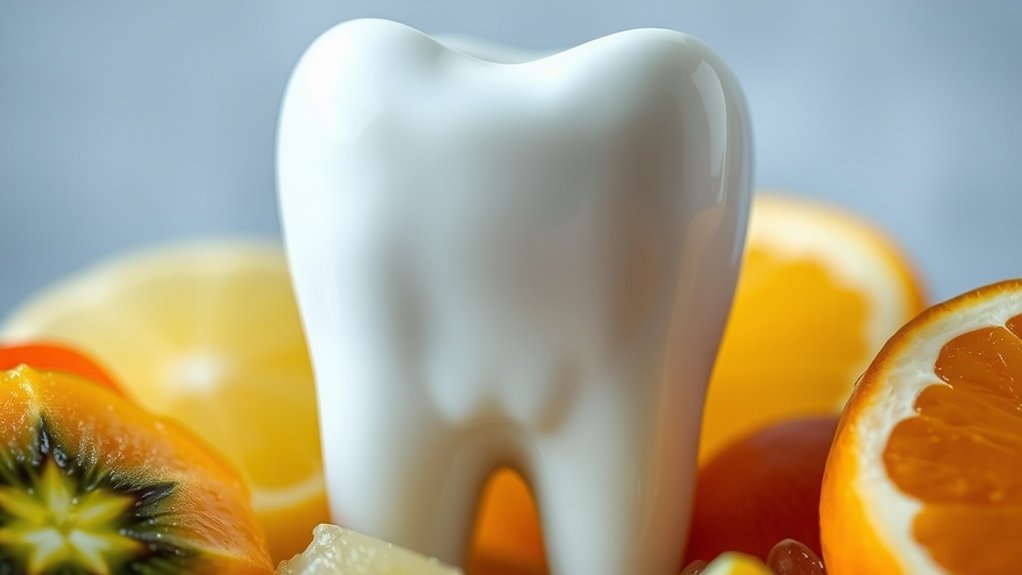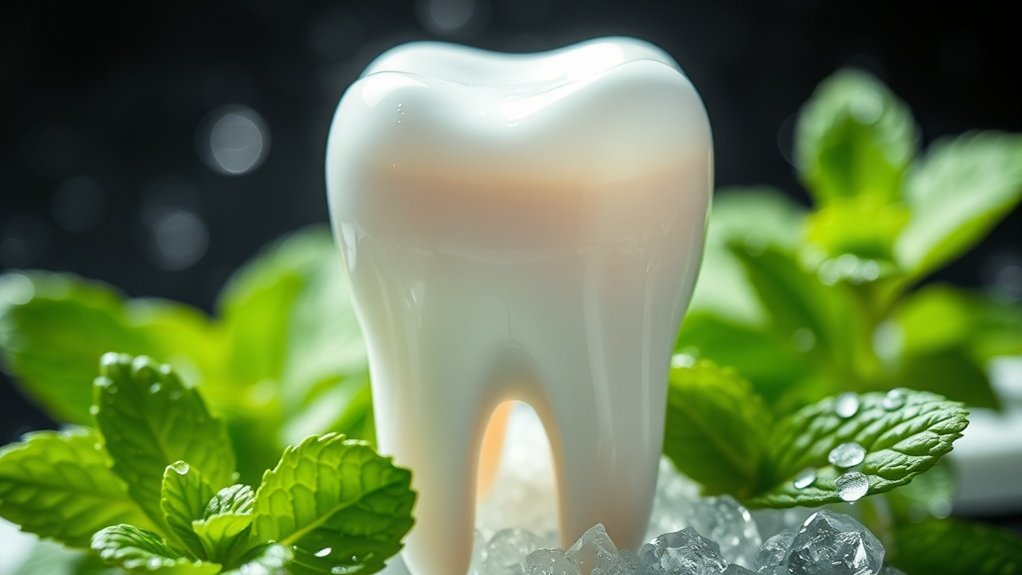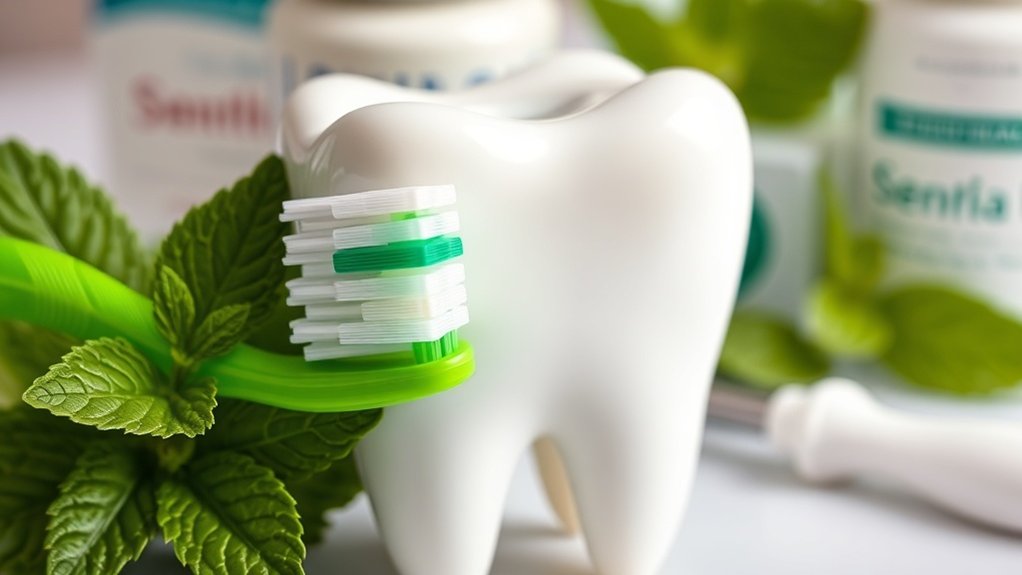Prodentim contains key minerals like calcium, phosphorus, and magnesium that naturally strengthen tooth enamel. Calcium is essential for enamel structure and remineralization. Phosphorus works alongside calcium to enhance enamel strength, while magnesium aids in maintaining enamel integrity. Fluoride helps prevent cavities, and potassium balances oral pH, further protecting enamel. Together, these minerals promote strong teeth and overall oral health. Discover how these elements work synergistically for maximum benefits.
Key Takeaways
- Calcium is essential for strengthening tooth enamel and supporting the remineralization process, reducing enamel erosion and cavity risk.
- Phosphorus enhances enamel strength and decay resistance by promoting hydroxyapatite formation, crucial for healthy teeth.
- Magnesium contributes to enamel density and integrity, facilitating calcium and phosphate deposition for effective remineralization.
- Fluoride makes tooth enamel more resistant to acid attacks, aiding in the prevention of cavities and promoting enamel health.
- Dicalcium Phosphate supports enamel strength and effectively enhances the remineralization process, reducing cavity risk and promoting gum health.
The Role of Calcium in Strengthening Tooth Enamel
Although you might not think about it every day, calcium plays an essential role in strengthening your tooth enamel. This mineral is important for maintaining enamel strength, as it’s a key component in its structure. When you consume adequate calcium, you support the remineralization process, which is fundamental for enamel repair. Research indicates that increased calcium intake can lead to a significant reduction in enamel erosion, helping to protect against cavities and sensitivity. Additionally, calcium aids in the absorption of other minerals necessary for dental health, enhancing your overall oral hygiene. By ensuring you get enough calcium in your diet, you’re actively contributing to the durability and resilience of your tooth enamel, promoting a healthier smile for years to come.
How Phosphorus Contributes to Dental Health
Phosphorus plays an essential role in maintaining your dental health, particularly in the formation and strength of tooth enamel. It works alongside calcium to facilitate the remineralization process, helping to repair and protect your teeth from decay. Understanding how phosphorus contributes to this process can empower you to make better choices for your oral care.
Role of Phosphorus
An essential mineral for maintaining robust dental health, phosphorus plays a significant role in strengthening tooth enamel. This mineral is essential for enamel reinforcement, as it works synergistically with calcium and other dental minerals to enhance the structural integrity of your teeth. When you consume phosphorus-rich foods, you promote the formation of hydroxyapatite, the primary mineral component of enamel. This process helps your teeth resist decay and withstand daily wear. Furthermore, phosphorus aids in the proper metabolism of carbohydrates and fats, ensuring that your body effectively utilizes other nutrients necessary for dental health. By incorporating phosphorus into your diet, you support your enamel’s strength, ultimately contributing to a healthier, more resilient smile.
Phosphorus and Tooth Remineralization
When it comes to tooth remineralization, phosphorus plays an essential role in restoring and maintaining enamel health. This mineral, found in various foods, works synergistically with calcium to strengthen tooth enamel. Phosphorus helps to form hydroxyapatite, the primary mineral component of your teeth, which is vital for remineralization. When you consume phosphorus-rich foods, it aids in the absorption of calcium, enhancing the process of enamel repair. Studies have shown that adequate phosphorus intake can reduce the risk of dental caries and promote overall oral health. By ensuring you have sufficient phosphorus in your diet, you can support your tooth enamel’s natural ability to remineralize, leading to stronger, healthier teeth.
The Importance of Magnesium for Enamel Remineralization
Magnesium plays an essential role in the complex process of enamel remineralization, acting as a key partner to other minerals like calcium and phosphate. This mineral is vital for maintaining enamel density, as it helps facilitate the deposition of calcium and phosphate in the tooth structure. Research indicates that magnesium deficiency can hinder remineralization, leading to weakened enamel and increased susceptibility to decay. By supporting the formation of enamel crystals, magnesium aids in restoring your tooth’s protective outer layer. Additionally, it helps balance the pH levels in your mouth, reducing acid erosion. Incorporating magnesium-rich foods or supplements into your diet can consequently bolster enamel remineralization, promoting stronger and healthier teeth.
Fluoride: A Key Mineral for Cavity Prevention
Fluoride stands out as one of the most effective minerals for cavity prevention, with numerous studies demonstrating its ability to enhance dental health. This mineral works by strengthening your tooth enamel, making it more resistant to acid attacks from bacteria and sugars. When you incorporate fluoride into your oral care routine, whether through toothpaste or mouth rinses, you considerably reduce the risk of enamel wear and cavities. Research indicates that fluoride not only helps in remineralizing early decay but also inhibits the growth of harmful bacteria in the mouth. By ensuring you get an adequate amount of fluoride, you’re taking a proactive step towards maintaining strong enamel and preventing cavities, ultimately leading to a healthier smile.
The Benefits of Zinc in Oral Care
Zinc plays an essential role in oral care, offering a range of benefits that contribute to overall dental health. Including zinc in your dental care routine can greatly enhance your oral health. Here are some key benefits:
- Reduces plaque formation
- Helps prevent gum disease
- Supports immune function in the mouth
- Aids in wound healing for oral injuries
- Inhibits the growth of harmful bacteria
Research shows that adequate zinc levels can lead to healthier gums and teeth. By integrating zinc into your oral health regimen, you’re taking a proactive step toward maintaining a balanced oral environment. This mineral not only protects your smile but also promotes long-term dental wellness. Embrace zinc as a fundamental component of your dental care strategy.
The Impact of Vitamin D on Mineral Absorption
Vitamin D plays an essential role in enhancing the absorption of key minerals vital for strong tooth enamel, such as calcium and phosphorus. When your body has adequate levels of vitamin D, it greatly improves the bioavailability of these minerals, making them more accessible for utilization. This guarantees that your teeth receive the necessary nutrients to maintain their strength and integrity.
Vitamin D’s Role
While many people focus on the direct benefits of minerals for tooth enamel, the role of vitamin D in mineral absorption is equally vital. This vitamin enhances your body’s ability to absorb key minerals, which can markedly impact your oral health. Here are some ways vitamin D contributes to effective mineral absorption:
- Promotes calcium uptake, essential for enamel strength
- Enhances phosphorus absorption, supporting mineralization
- Regulates parathyroid hormone, influencing calcium balance
- Supports immune function, reducing inflammation in the gums
- Aids in the overall metabolism of essential nutrients
Enhanced Mineral Bioavailability
When it comes to maximizing the benefits of minerals for your tooth enamel, enhanced mineral bioavailability plays an essential role, particularly in how vitamin D facilitates this process. Vitamin D greatly improves the absorption of key minerals, such as calcium and phosphorus, which are important for strengthening your enamel. Without sufficient vitamin D, even the best mineral supplements may not deliver ideal benefits, as your body struggles to absorb these critical nutrients. Research shows that adequate vitamin D levels lead to improved mineral bioavailability, ensuring that your enamel receives the support it needs. By focusing on both vitamin D intake and key minerals, you can enhance their effectiveness, promoting stronger tooth enamel naturally.
Potassium’s Role in Maintaining Oral Ph Balance
Potassium plays an essential role in maintaining the oral pH balance, which is necessary for ideal dental health. It helps regulate acidity levels in your mouth, promoting a favorable environment for the oral microbiome. A balanced pH is important for oral wellness, as it can prevent the growth of harmful bacteria and support beneficial microorganisms.
Potassium is vital for oral health, regulating pH and fostering a balanced environment for beneficial microbes.
- Supports saliva production, aiding in natural remineralization.
- Prevents enamel erosion by neutralizing acids.
- Enhances the health of gums and tissues.
- Reduces the risk of cavities and tooth decay.
- Helps maintain overall oral microbiome stability.
Incorporating potassium into your diet can contribute substantially to your dental health by fostering a favorable oral pH balance.
How Copper Supports Gum Health and Enamel Integrity
Copper plays a significant role in promoting gum health and maintaining enamel integrity, complementing the benefits of potassium in your oral care routine. This essential mineral aids in collagen formation, providing structural support for your gums and enhancing their resilience against infections. Stronger gums contribute to better cavity defense, reducing the risk of decay that can affect your healthy teeth. Additionally, copper possesses antimicrobial properties that help combat harmful bacteria in your mouth, further supporting your overall dental health. By incorporating copper into your diet, you can bolster your gum health and protect your enamel, ensuring a strong foundation for your teeth. Prioritizing copper-rich foods can lead to lasting improvements in your oral hygiene and well-being.
The Synergistic Effect of Minerals in Prodentim for Optimal Oral Health
While many minerals play individual roles in maintaining oral health, the combined effects of these nutrients in Prodentim create a powerful synergy that enhances overall dental well-being. For example, dicalcium phosphate not only supports enamel strength but also contributes to decay resistance. When these minerals work together, they provide extensive teeth protection by:
- Strengthening enamel against acids
- Enhancing mineral absorption in the mouth
- Promoting the remineralization process
- Reducing the risk of cavities
- Supporting gum health alongside enamel integrity
This synergy means you’re not just relying on one mineral’s benefits; instead, you’re harnessing a collective power that effectively supports your oral health. By integrating these minerals, Prodentim offers a more efficient approach to maintaining strong, healthy teeth.
Frequently Asked Questions
Can Prodentim Minerals Help Reverse Tooth Decay?
Prodentim minerals can support reversing tooth decay by enhancing enamel strength and re-mineralizing teeth. Regular use, combined with good oral hygiene, increases your chances of improving dental health and preventing further decay effectively.
Are There Any Side Effects to Using Prodentim?
Side effects seldom surface when you use Prodentim; however, some users report mild mouth irritation or digestive discomfort. It’s smart to consult your dentist before starting any new supplement to make certain it’s right for you.
How Long Does It Take to See Results With Prodentim?
You’ll typically notice results with Prodentim within a few weeks. Consistent use can enhance oral health, but individual experiences may vary. Factors like diet and oral hygiene also influence how quickly you see improvements.
Can Children Use Prodentim for Dental Health?
Prodentim’s like a gentle guardian for dental health, and yes, children can use it. However, consult a pediatric dentist beforehand to ascertain it’s appropriate for their specific needs and dental development.
Is Prodentim Suitable for Individuals With Sensitive Teeth?
Yes, Prodentim can be suitable for individuals with sensitive teeth. Its unique formulation helps strengthen enamel and reduces sensitivity, making it a beneficial choice for those seeking relief while maintaining oral health. Always consult your dentist first.
Conclusion
Incorporating key minerals like calcium, phosphorus, and magnesium into your routine can greatly enhance your tooth enamel’s strength. But what if you learned that a synergistic blend of these minerals, as seen in Prodentim, could take your oral health to an entirely new level? Imagine the confidence of a radiant smile, fortified against decay and damage. The secret lies in understanding how these minerals work together—are you ready to unleash the full potential of your dental care?
